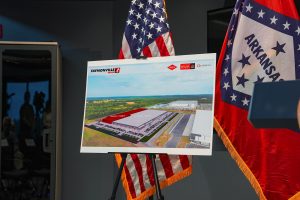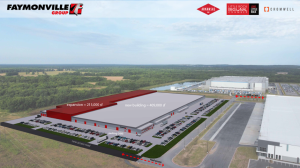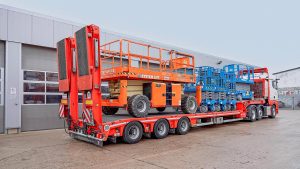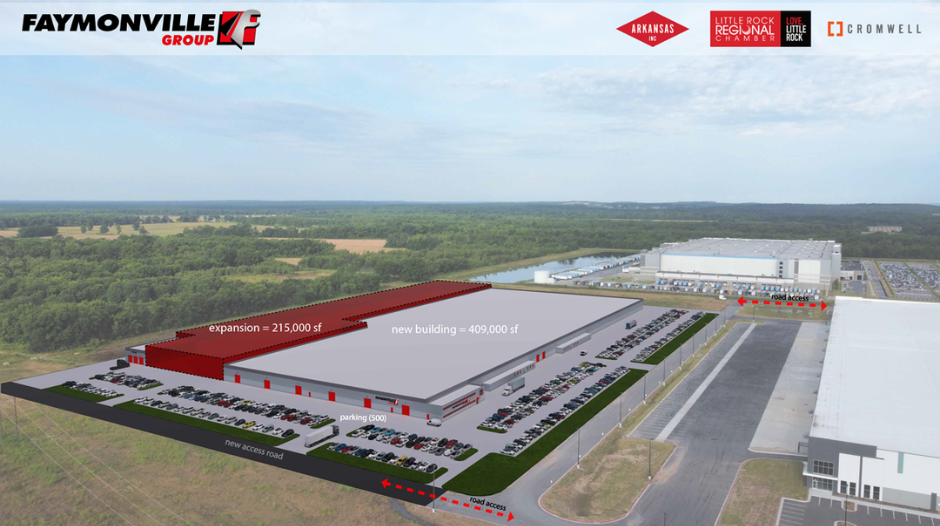- Discover how the Little Rock trailer plant is set to revolutionize U.S. manufacturing with a strategic $100M investment and innovative production techniques.
- Uncover the transformative impact of Arkansas’s prime logistics hub on trailer production and heavy transport solutions, driving local economic growth.
- Explore Faymonville Group’s phased development strategy that promises robust job creation and a competitive “Made in America” edge.
Overview of the Little Rock trailer plant

The Little Rock trailer plant is set to transform U.S. manufacturing with a $100M investment.
The Faymonville Group is set to launch its first U.S. manufacturing site with a new Little Rock trailer plant, marking a significant milestone in the company’s expansion strategy. With a $100 million investment, the project is designed to bolster local economic growth and enhance the nation’s manufacturing capabilities. The facility, located at the Port of Little Rock in Arkansas, has been meticulously chosen for its superior access to major highways, railroads, navigable waterways, and proximity to the Bill and Hillary Clinton National Airport. For further news on domestic production initiatives, see our US Manufacturing updates.
Faymonville Group’s introduction to the Arkansas market began through its longstanding relationship with trailer dealership Hale Trailer. In 2016, the company delivered its first vehicle to the U.S. via Hale Trailer, a milestone that paved the way for further expansion and reinforced its commitment to the North American market.
“This new trailer manufacturing facility will serve as a strategic hub for trailer production and heavy transport vehicles, ultimately contributing to job creation and economic development within the region.”
Faymonville’s long-standing reputation in delivering robust transport solutions aligns perfectly with the demands of the U.S. market.
Project Details and Economic Impact
The project is planned to be developed in two phases. The initial phase will cover 409,000 square feet, while the second phase is expected to expand the facility to 624,000 square feet. Once fully operational, the Little Rock trailer plant is projected to generate 500 direct jobs along with 389 indirect positions. These new roles will further cement Arkansas as a pivotal logistics hub in the U.S. manufacturing landscape. For more detailed news on manufacturing trends, explore our Manufacturers section.
Enjoying our insights?
Subscribe to our newsletter to keep up with the latest industry trends and developments.
Stay Informed
Strategically located at the Port of Little Rock, the facility capitalizes on major transportation networks. The 54-acre site, located at the Port of Little Rock, provides access to major interstates, Class I railroads, navigable waterways, and a national airport.
Faymonville Group’s decision to invest in Little Rock was driven by several factors:
- Strategic Location: The site’s proximity to key transportation networks and infrastructure ensures efficient distribution and connectivity.
- Economic Incentives: The local government’s support, combined with the potential for substantial economic impact—estimated at $239 million—makes the investment particularly attractive.
- Market Potential: With the U.S. trailer market experiencing fluctuations, the establishment of a locally produced “Made in America” product line addresses both market demand and consumer confidence.
The project’s phased development allows for scalability, ensuring that as trailer orders evolve, the facility can adapt to increased production volumes while maintaining high quality and safety standards. Expanded production capabilities are expected to boost overall output significantly, with state-of-the-art automated systems playing a pivotal role in ensuring consistent, high-quality production.
Why Choose Little Rock for Trailer Manufacturing?
The Little Rock trailer plant leverages the strategic advantages of Arkansas’s transportation infrastructure. With access to interstates, Class I railroads, and navigable waterways, the facility is ideally situated to serve both domestic and international markets. Moreover, being within a mile of a major national airport underscores the location’s logistical benefits, streamlining the distribution process across the U.S. For the latest trends in logistics and distribution, check out our Logistics insights.
The choice of Little Rock underscores Faymonville’s commitment to expanding its U.S. manufacturing footprint. This move is particularly significant given the recent market dynamics where trailer orders have seen a decline, with fleets prioritizing investments in new power units. By localizing production, Faymonville Group aims to overcome supply chain challenges and deliver more responsive service and support, including enhanced availability of spare parts and maintenance services for Cometto-branded vehicles.
Faymonville Group’s U.S. Market Strategy

Faymonville’s commitment to ‘Made in America’ quality drives its expansion into the U.S. market. Official announcement and a new step for the “FAYmily” : After evaluating locations across the US, the Faymonville Group has selected a site in Little Rock, Arkansas for its first US facility.
The establishment of the Little Rock trailer plant is a cornerstone of Faymonville Group’s strategy to penetrate and expand its presence in the U.S. market. By producing trailers domestically, the company can ensure quicker turnaround times, lower transportation costs, and enhanced customer service. This strategic localization also reinforces the “Made in America” label—a point of pride for U.S. consumers and businesses alike.
The facility will not only focus on assembling individual components but also on advancing comprehensive transport solutions. With a robust history dating back to 1843, the Faymonville Group is well-equipped to meet the challenges of the U.S. market while staying at the forefront of trailer innovation and production. This includes ongoing research and development initiatives at the company’s Luxembourg headquarters aimed at introducing new products tailored to American market needs. For additional insights into the evolving landscape of trailer production, explore our Trailers section.
- Technological Innovations and Production Methodologies: The new manufacturing facility in Little Rock showcases significant technological innovations, echoing the production prowess observed at Faymonville’s international sites. State-of-the-art equipment, such as advanced CNC machinery for milling, turning, and drilling, alongside automated welding robots, forms the backbone of their production process. Additionally, a high degree of automation in pendle-axle production will enhance efficiency and precision, ensuring that the Little Rock trailer plant meets the rigorous quality standards demanded by the American market. These automated systems are instrumental in increasing production capacity while maintaining impeccable quality controls. For more on cutting-edge industrial technology, visit our Industrial Tech page.
- Supply Chain and Market Trends: In response to current global supply chain challenges, Faymonville’s strategy to localize production in the U.S. significantly reduces dependency on international shipping and streamlines component logistics. This move is particularly strategic amid ongoing disruptions, positioning the company to respond with increased agility and reduced lead times to meet market demands.
- Environmental and Sustainability Considerations: Although specific green manufacturing practices for the Little Rock facility have not been exhaustively detailed, Faymonville’s overall commitment to sustainability is evident. Their European operations integrate sustainable practices—emphasizing efficient resource use and waste reduction—which likely serve as a blueprint for the new facility. This enhanced sustainability focus will see the Little Rock plant adopt similar resource efficiency measures and waste reduction initiatives, reinforcing the company’s dedication to environmental responsibility and long-term growth.
Additional Executive Insights
Faymonville Group executives have emphasized that the strategic localization of production in the U.S. is not only a response to current market challenges but also a long-term commitment to innovation, efficiency, and sustainability. Their vision for the Little Rock facility includes leveraging advanced automation and sustainable practices to set new benchmarks in quality and operational safety.
Job Creation and Economic Benefits

Phased development ensures scalable production to meet evolving trailer market demands.
The Little Rock trailer plant is anticipated to create a significant number of job opportunities. With 500 direct positions and an additional 389 indirect jobs expected, the economic ripple effect will be felt across local communities. These new roles will span manufacturing, logistics, engineering, and administrative functions, contributing to a diverse and sustainable workforce. For more insights on job growth in the industry, check out our Jobs page.
Furthermore, the economic impact of this investment is estimated at $239 million, reinforcing the region’s position as a vital component of the U.S. industrial landscape. This influx of economic activity not only benefits the local community but also strengthens the broader supply chain for heavy transport vehicles across the nation.
Investment and Production Timeline
The phased development strategy for the Little Rock trailer plant is designed to ensure a seamless transition from construction to full-scale production. The initial phase, covering 409,000 square feet, will lay the groundwork for efficient assembly and production operations. The subsequent expansion to 624,000 square feet will accommodate growing demand and provide space for advanced manufacturing technologies.
Faymonville Group aims to have the production operational by early 2026. This timeline includes setting up production lines for individual components and establishing comprehensive service and spare parts support for the U.S. market. The strategic timing of this project coincides with efforts to stabilize trailer production levels following recent market fluctuations.
How Will the Facility Transform U.S. Manufacturing?

Sustainable practices from European operations inspire the facility’s resource efficiency measures.
The Little Rock trailer plant is expected to bring transformative changes to U.S. manufacturing by localizing production and reducing dependency on imports. This strategic investment by the Faymonville Group will enhance the quality and responsiveness of trailer production, fostering innovation and boosting the overall competitiveness of the U.S. transport sector.
Moreover, by providing localized production capabilities, the facility will contribute to reducing lead times and improving the supply chain resilience for trailer production. This initiative represents a forward-thinking approach to manufacturing that aligns with modern economic trends and the increasing demand for high-quality, domestically produced heavy transport vehicles. To explore more about the latest transportation trends, read more about Transportation.
Future Prospects for the Little Rock Trailer Plant
Looking ahead, the Little Rock trailer plant is poised to become a key player in the U.S. manufacturing sector. The investment not only demonstrates Faymonville Group’s confidence in the U.S. market but also paves the way for future innovations in trailer production and heavy transport solutions. As market conditions evolve, the facility’s scalable design will allow it to adapt swiftly to changing demands, ensuring long-term success and sustainability.
The strategic move to establish a domestic production base also positions the company to better serve the U.S. market amid fluctuating trailer demand. With a focus on efficiency, quality, and customer service, the Little Rock trailer plant is set to become a benchmark for future investments in the heavy transport vehicle sector. For more on the challenges and opportunities in localized production, learn more about Supply Chain enhancements.
In conclusion, the new Little Rock trailer plant represents a pivotal investment by the Faymonville Group in U.S. manufacturing. With its strategic location, phased development plan, and strong economic impact, the facility is poised to enhance the U.S. trailer production landscape, create jobs, and drive innovation in heavy transport solutions.
Key Developments in the Little Rock Trailer Plant Project
- $100M Investment: Significant capital allocation for the development of a state-of-the-art manufacturing facility in Little Rock.
- Phased Expansion: Initial 409,000 square feet planned for phase one with expansion to 624,000 square feet in phase two.
- Job Creation: Projected to generate 500 direct jobs and 389 indirect positions, bolstering the local economy.
- Strategic Location: Leveraging the Port of Little Rock’s access to major highways, railroads, waterways, and proximity to a national airport.
- Operational Timeline: Production set to begin by early 2026, positioning Faymonville Group as a key player in U.S. heavy transport solutions.
- Local Production Benefits: Enhances supply chain efficiency and supports the “Made in America” initiative, meeting growing market demand.
Explore External Resources and Insights on Faymonville and Related Companies
- Learn more about Faymonville’s history, products, and innovations at Faymonville Group.
- For more information on Hale Trailer’s offerings and dealership services, visit Hale Trailer.
- Explore the range of custom trailer solutions from Cometto, a part of the Faymonville family.
- Find out about the U.S. trailer market trends and data from Xtreme Trailers Website.
- For heavy transport industry news, visit the authority on commercial vehicle safety at Commercial Vehicle Safety Alliance (CVSA).
- Stay updated on innovations in U.S. manufacturing and logistics technology with Manufacturing.net.
- Explore the specialized trailer products, including the Max Trailer and Cometto brands, by visiting the Faymonville Product Range page.
Discover More Industry Insights and Global Resources
- Learn more about U.S. manufacturing trends and economic strategies at the U.S. Department of Commerce.
- Explore advanced manufacturing technologies and innovations at the National Institute of Standards and Technology (NIST).
- Review safety regulations and guidelines for heavy transport at the Federal Motor Carrier Safety Administration (FMCSA).
- Find comprehensive data on U.S. transportation trends and logistics at the Bureau of Transportation Statistics (BTS).
- Access economic impact reports and market data at the U.S. Bureau of Economic Analysis (BEA).
- Understand global supply chain dynamics and export strategies at the International Trade Administration.




















